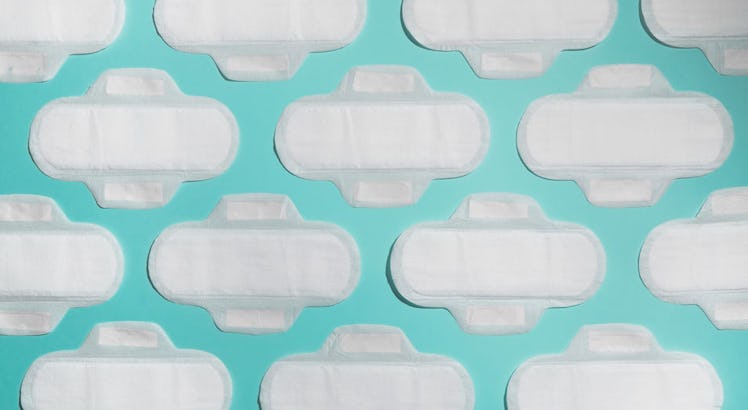
The Pink Tax Makes Your Period Products Expensive AF, But This State Just Got Rid Of It
If you menstruate, then I'm willing to bet you've been annoyed by the price of period products at some point because, come on, paying $8 for a tiny box of emergency tampons at a gas station is freaking absurd. However, I have some good news: In a small, but mighty victory during this week's midterm elections, the state of Nevada voted to remove the pink tax on period products, meaning that, starting Jan. 1, 2019, there will no longer be a sales tax on things like tampons and pads in Nevada. What's more, according to Teen Vogue, Nevada also made history as "the very first [state] to put menstruation directly on the ballot," which is honestly really exciting in and of itself.
Starting in 2019, CNN reports, the 6.86 percent sales tax added on tampons and pads will no longer plague the wallets of Nevada residents. According to the news outlet, nine other states — including Connecticut, Florida, Illinois, and New York, among others — have previously led the way on removing the pink tax, which means we've only got 40 more states to go, guys! (Sigh.)
As per CNN, those who were in support of removing the tax in Nevada pointed out that menstrual products are a "necessity, not a luxury" (duh). Opponents of repealing the pink tax, on the other hand, were apparently concerned about a potential loss in state revenue, the news outlet explained. However, CNN wisely pointed out that things like candy and soda are already exempt from sales taxes in the state of Nevada — so, you know, #priorities.
Now, before I go any further, just in case you don't really know the details on what the pink tax is, exactly, the website pink.tax sums it up pretty well:
The Pink Tax refers to the phenomenon whereby goods and services cost more for females than males for no good reason.
I know, right?
But this gender-based price inflation happens all over the globe, with all kinds of products related to women's health and hygiene, not just period products. And it's called the "pink tax" because a lot of those goods actually have pink on their packaging — because, you know, all girls just loooove pink, right?
But the pink tax is more than just unfair and annoying; it's a genuine matter of public health and women's rights. Removing this extra financial burden from those who need menstrual products is part of a much larger battle toward something called menstrual equity, which is all about making period products easily and safely accessible for those who need them.
As the law and policy organization Period Equity explains, women who are unable to afford tampons and pads are potentially at risk for infection, isolation, and missed days of work or school. According to the organization, this includes incarcerated women, women in shelters, and even women who are simply struggling to make ends meet financially.
The hope is that, eventually, not only will the pink tax be removed from every nation in the world, but that these products will be made easily available, and that they'll be provided at no cost for particularly vulnerable people and communities.
This would ultimately mean providing tampons in schools, shelters, and correctional facilities, according to Period Equity. As of now, progress is being made in some places; as I mentioned before, 10 states in the U.S. have now eliminated the pink tax altogether, and according to NPR, seven more states "have introduced legislation aimed at doing the same."
While we certainly have a long way to go before our whole country — not to mention the whole world — is on board, never forget that every step in support of women's health is a win.